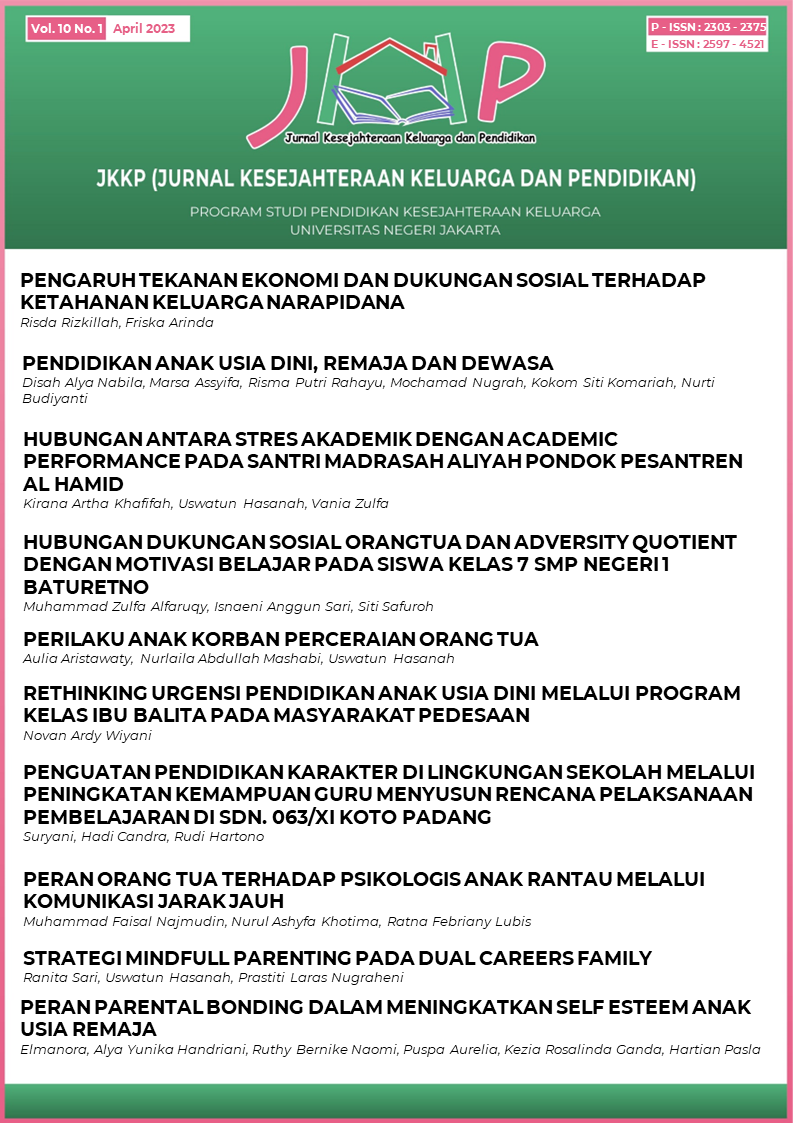PERAN ORANG TUA TERHADAP PSIKOLOGIS ANAK RANTAU MELALUI KOMUNIKASI JARAK JAUH
DOI:
https://doi.org/10.21009/JKKP.101.08Keywords:
peran orang tua, anak perantauan, komunikasi jarak jauh, psikologiAbstract
Abstrak
Penelitian ini bertujuan untuk menganalisis strategi komunikasi jarak jauh yang efektif antara orang tua dan anak rantau dengan memberikan pemahaman yang lebih baik tentang bagaimana orang tua dapat memainkan peran yang efektif dalam mendukung kesejahteraan psikologis anak rantau yang jauh dari keluarga. Metode yang digunakan dalam penelitian ini yaitu kajian pustaka yang menggunakan sumber informasi dari bahan pustaka dengan mengumpulkan informasi dan data dari sumber-sumber tertulis seperti jurnal, buku, dan dokumen lainnya. Hasil penelitian menunjukan bahwa dengan adanya teknologi dan media komunikasi dapat menjadi sarana yang efektif untuk menjaga hubungan dan komunikasi antara orang tua dan anak rantau. Kunci efektif dan efisien peran orang tua terhadap psikologis anaknya yang sedang merantau melalui komunikasi jarak jauh diantaranya 1) mendukung anak rantau secara emosional, dengan adanya dukungan secara emosional dari orang tua, anak akan lebih mampu mengatasi stres dan masalah emosional yang mungkin muncul selama masa transisi menjadi anak rantau, 2) menjaga komunikasi yang baik, dengan adanya komunikasi yang baik antara orang tua dan anak rantau sangat penting agar anak merasa terhubung dengan keluarga dan rumah mereka, 3) memberikan motivasi dan dukungan dalam karir dan pendidikan, agar memastikan anak dapat mencapai potensi terbaiknya, dan 4) memberikan dukungan finansial, agar anak dapat memenuhi kebutuhan hidupnya selama merantau. Penelitian ini menghasilkan simpulan bahwa peran orang tua terhadap anak rantau melalui komunikasi jarak jauh sangat penting untuk mendukung keberhasilan anak dalam belajar dan kesejahteraan psikologisnya. Komunikasi jarak jauh ini mencakup dukungan emosional, motivasi dalam karir, finansial, dan dukungan moral.
Abstract
This study aims to analyze effective strategies for long-distance communication between parents and children who are living overseas, in order to provide a better understanding of how parents can effectively support the psychological well-being of their overseas children who are far from home. The research method employed in this study is a literature review, which uses information gathered from library resources such as books, journals, and other written documents. The results of the study demonstrate that the use of technology and communication media can be an effective means of maintaining relationships and communication between parents and overseas children. Key strategies that parents can employ in order to support the psychological well-being of their migrating children through long-distance communication include: 1) providing emotional support, which can help children better cope with stress and emotional problems that may arise during the transition period; 2) maintaining good communication, which is crucial for helping children feel connected to their families and homes; 3) providing motivation and support in education and career goals to help children achieve their best potential; and 4) providing financial support, which can help ensure that children can meet their basic needs while living overseas. This research concludes that the role of parents towards overseas children through long-distance communication is very important to support children's success in learning and psychological well-being. This long-distance communication includes emotional support, career motivation, financial, and moral support.
Downloads
Published
Issue
Section
License
Copyright (c) 2025 Muhammad Faisal Najmudin, Nurul Ashyfa Khotima, Ratna Febriany Lubis

This work is licensed under a Creative Commons Attribution-ShareAlike 4.0 International License.
Authors who publish with this Journal agree to the following terms:
- Author retain copyright and grant the journal right of first publication with the work simultaneously licensed under a creative commons attribution licensethat allow others to share the work within an acknowledgement of the work’s authorship and initial publication of this journal.
- Authors are able to enter into separate, additional contractual arrangementfor the non-exclusive distribution of the journal’s published version of the work (e.g. acknowledgement of its initial publication in this journal).
- Authors are permitted and encouraged to post their work online(e.g. in institutional repositories or on their websites) prior to and during the submission process, as it can lead to productive exchanges, as well as earlier and greater citation of published works.
Users/public use of this website will be licensed to CC BY SA
![]()







